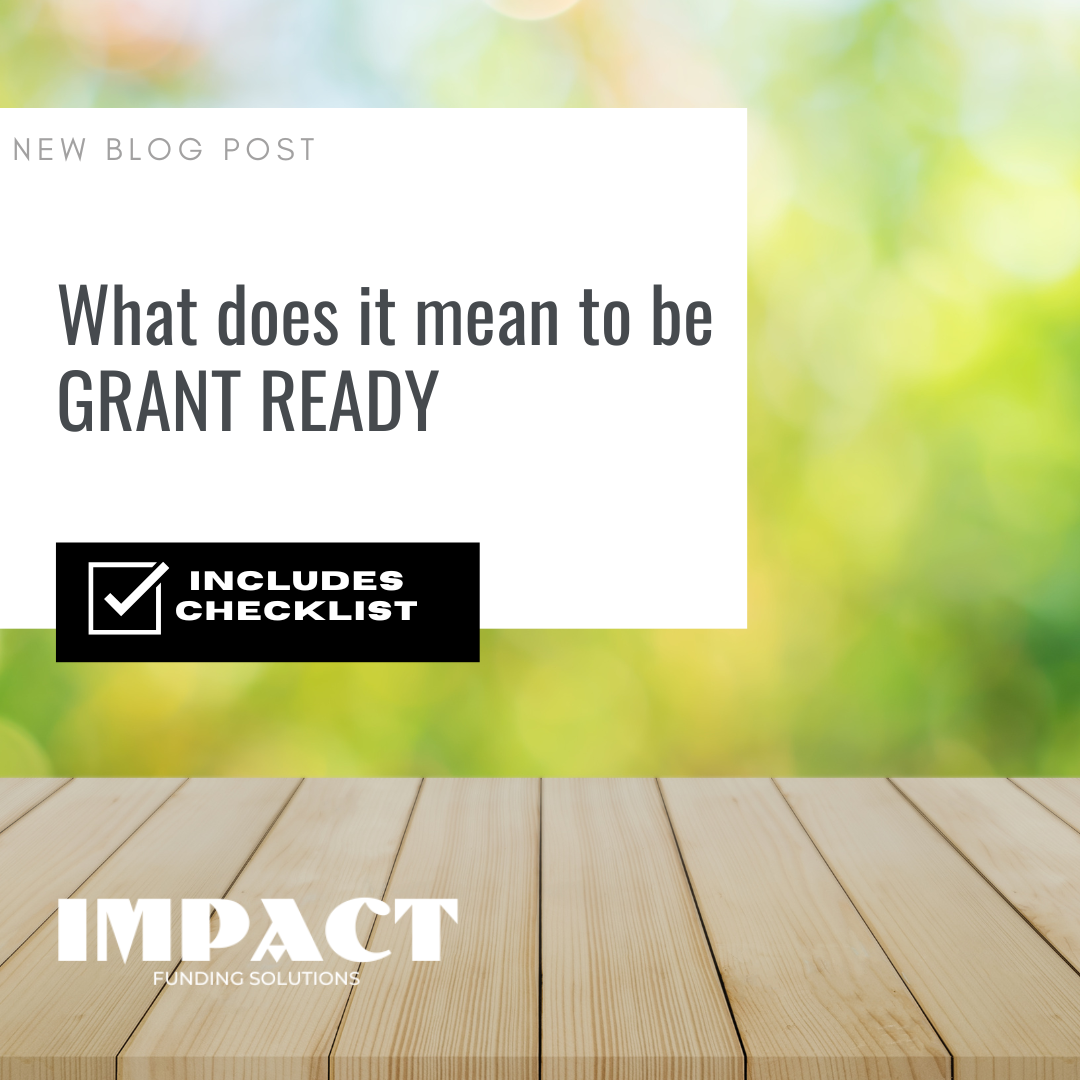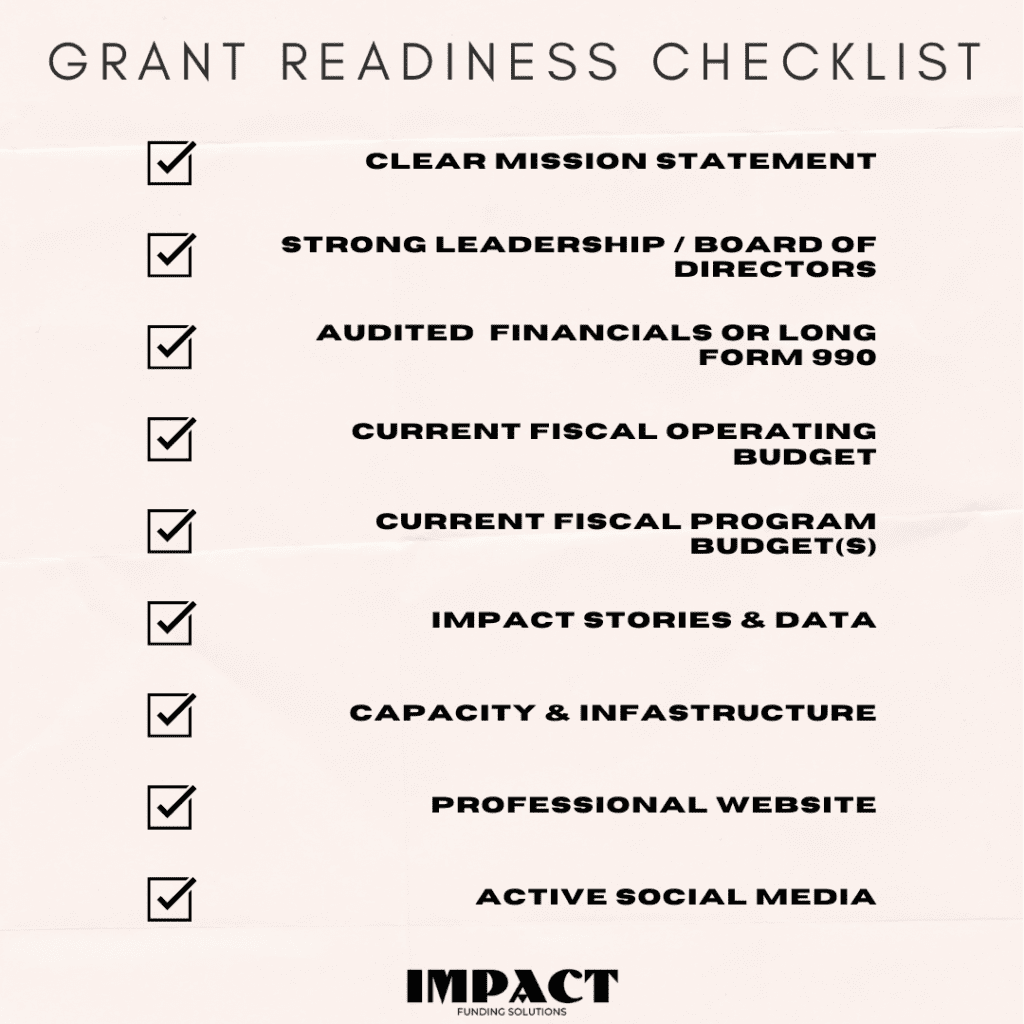What Does It Mean to be Grant Ready?

What Does It Mean to Be Grant Ready?
“Never doubt that a small group of thoughtful committed citizens can change the world: indeed it’s the only thing that ever has.” -Margaret Mead
In the competitive world of nonprofit funding, being “grant ready” can make the difference between securing critical funding and facing financial shortfalls. Grant readiness goes beyond having a good cause or project; it involves a comprehensive preparation process that demonstrates an organization’s ability to manage and utilize funds effectively. At Impact Funding Solutions, we specialize in guiding organizations through this process, ensuring they are well-equipped to meet funders’ expectations and secure the necessary resources for their initiatives.
Understanding Grant Readiness
Grant readiness refers to an organization’s preparedness to apply for and manage grant funding successfully. It encompasses a range of factors, including organizational stability, program design, capacity, and compliance. Being grant ready means an organization can present itself as a reliable and capable recipient of funds, with the structures and processes in place to achieve the desired outcomes. This readiness is crucial because it not only increases the chances of securing funding but also ensures the organization can deliver on its promises to funders and stakeholders.
Key Components of Grant Readiness
Organizational Stability
A grant-ready organization has a clear mission and vision, strong leadership, and robust governance structures. This includes having a well-defined strategic plan, a committed board of directors, and financial stability demonstrated through transparent accounting practices and solid financial health. These elements assure funders that the organization is well-managed and capable of sustaining its operations and projects over the long term.
TIP: If your organization is not able to pay for audited financial statements – complete and submit the long form 990 annually to the IRS which is more transparent than the simple postcard version.
Program Design and Impact
Effective program design is central to grant readiness. Organizations need to have well-defined programs with clear, measurable outcomes. Demonstrating past success through impact stories and data helps to build credibility. Funders want to see that an organization not only has compelling programs but also the ability to track and report on their impact.
TIP: Most grants are program grants. Spending the time to clearly define your program goals, impact statement, and anticipated outcomes is critical. In addition to clearly defined budgets for each program for each fiscal year.
Website and Social Media
In today’s digital age, having a professional website and maintaining consistent social media presence are critical components of grant readiness. A professional website serves as a central hub where funders can learn about an organization’s mission, programs, and impact. It provides a platform to showcase success stories, financial transparency, and organizational credibility. Consistent social media activity complements this by engaging stakeholders, sharing real-time updates, and building a community of supporters. Together, these digital tools help establish an organization’s legitimacy and visibility, making it more attractive to potential funders who often conduct thorough online research before awarding grants. In essence, a strong online presence signals that the organization is modern, communicative, and accountable—key qualities that funders look for in grant recipients.
IMPORTANT NOTE: The grant review team at IMPACT has shared that when reviewing grant applications the very first place they go to look when considering a possible grant recipient is the nonprofits website.
Capacity and Infrastructure
Being grant ready means having the necessary infrastructure to support grant-funded activities. This includes adequate staffing, technology, and other resources. Effective systems and processes for project management, data collection, and reporting are essential. Without these, even well-funded programs can struggle to deliver results.
TIP: If you do not have a formal method for collecting data in a dedicated software, start tracking information in a spreadsheet. One client we have has named this their “data bible” and holds information on important results such as number of clients served, age groups, ethnicities to other data such as # of volunteer hours dedicated etc. Update this once a month so you will have annual data before you know it!
Compliance and Accountability
Understanding and meeting grant compliance requirements is critical. Organizations must have mechanisms in place for accountability and reporting. This ensures that funds are used appropriately and that the organization can provide the necessary documentation to funders. Strong compliance practices reduce the risk of financial mismanagement and build trust with funders.
This is important because funders will be more likely to approve you for grants in future years!
Steps to Achieve Grant Readiness
Conducting a Self-Assessment
The first step towards grant readiness is conducting a thorough self-assessment. This helps organizations identify their strengths and areas for improvement. Tools and resources for self-assessment can provide valuable insights. Understanding where gaps exist allows organizations to focus their efforts on areas that need development.
Building Organizational Capacity
Building capacity involves investing in training and professional development for staff and volunteers. Enhancing internal systems and processes is also crucial. This might include implementing new technology solutions, improving data management practices, or refining project management methodologies. By building capacity, organizations become more efficient and better equipped to manage grant-funded projects.
Developing Strong Proposals
A compelling grant proposal is essential for securing funding. This involves crafting a narrative that clearly articulates the need for funding, the proposed solution, and the expected impact. Proposals should align with the priorities and requirements of the funders. Tailoring each proposal to the specific interests of the funder increases the chances of success.
THIS IS OUR ZONE OF GENIUS! CONTACT US TODAY TO GET INFORMATION ON OUR GRANT WRITING SERVICES!
Establishing Relationships with Funders
Building relationships with potential funders is an important part of grant readiness. This involves networking, attending relevant events, and engaging in ongoing communication with funders. Establishing trust and demonstrating commitment can lead to more successful funding outcomes. Effective follow-up and relationship management are key to maintaining these connections over time.
TIP: connect with the organization and key decision makers via social media channels such as LinkedIN. Engaging via online methods can also help your organization get recognized.
Common Challenges and How to Overcome Them
Limited Resources and Staffing
Many organizations face challenges related to limited resources and staffing. To overcome these, it is important to maximize existing resources effectively. This might involve cross-training staff, utilizing volunteers, or forming partnerships with other organizations. Creative solutions and resourcefulness can help organizations do more with less.
Navigating Complex Grant Requirements
Grant applications often come with complex requirements that can be daunting. To navigate these, organizations should invest time in thoroughly understanding the requirements and seeking assistance if needed. This could involve consulting with experts, attending grant-writing workshops, or using template guides. Staying organized and diligent in following instructions can ease the process.
Sustaining Grant Readiness Over Time
Grant readiness is not a one-time effort; it requires ongoing commitment. Continuous improvement and adaptation are necessary to remain competitive. This involves regularly updating organizational practices, seeking feedback, and staying informed about trends and changes in the funding landscape. By staying proactive, organizations can sustain their grant readiness and continue to thrive.
TIP – Grant funding is just one piece of the fundraising strategies available to a nonprofit organization. Make sure you are actively implementing multiple streams of fundraising to not only help with your cash flow, but also to show potential grant funders your organization has diversified income.
Impact Funding Solutions’ Support for Grant Readiness
At Impact Funding Solutions, we offer a range of services to support organizations in achieving grant readiness. Our services include grant writing and proposal development, capacity building, and compliance support. We provide consulting to help organizations build their internal capacity and develop strong, competitive grant proposals. Our compliance support ensures organizations can meet funders’ requirements and maintain accountability. We work with nonprofits at all stages of their development. Even new nonprofits can have a successful fundraising and grant strategy from very early days. Ask us how!
Is Your Nonprofit Organization Grant Ready?
Being grant ready is crucial for any organization seeking to secure funding and deliver impactful programs. Investing in grant readiness not only increases the chances of obtaining grants but also enhances the overall effectiveness and sustainability of the organization. At Impact Funding Solutions, we are dedicated to helping organizations navigate the complexities of grant readiness and achieve their funding goals. Contact us today to learn more about how we can support your organization in becoming grant ready.
For more information on grant readiness and how Impact Funding Solutions can assist your organization, please contact us at https://impactfundingsolutions.com/contact/
Explore our range of services and access additional resources to help you on your journey to securing funding.


